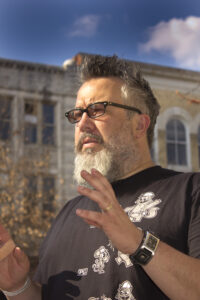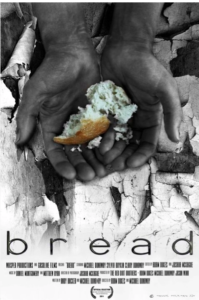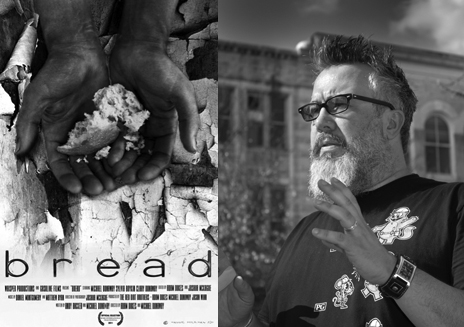 Michael Dunaway is a filmmaker. Perhaps he’s always been one on the inside. But this weekend following a significant win at a film festival of note, he undoubtedly feels more comfortable with the title. Having transitioned careers from a successful tour in the corporate world to making movies, his approach to the craft does not follow the norm. Then again, is there a normal or traditional route for filmmakers these days?
Michael Dunaway is a filmmaker. Perhaps he’s always been one on the inside. But this weekend following a significant win at a film festival of note, he undoubtedly feels more comfortable with the title. Having transitioned careers from a successful tour in the corporate world to making movies, his approach to the craft does not follow the norm. Then again, is there a normal or traditional route for filmmakers these days?
Dunaway is the most likable of people—a heart permanently stapled to the sleeve of every shirt he’s ever worn. He’s marked by horn-rimmed glasses and a graying beard that is greatly exaggerated like most everything about him. When he enters a room, people take notice of his smile and instant warmth. And you tend to hug this gregarious forty-something even when he’s sweating profusely and working the room vigorously like the great French actor Gerard Depardieu insisting that everyone have a good time and be creative.
Such a personality might not be best suited to the tyrannical requirements that are associated with some of the best film directors. I cannot imagine Megan Fox, for example, complaining to a tabloid about Dunaway’s evil ways on set. He’s just not that kind of guy.
 That is why I was so impressed when he shared with me his short film “Bread.” It recently won an award for best narrative American short at the Rome International Film Festival. The story is arguably post-apocalyptic. Dunaway plays a man hiding with his family in a house while a battle rages somewhere outside. He shares bread with his wife (played by Sylvia Boykin). Dunaway’s own daughter, Clary, plays his daughter in the film. Dunaway adapted the story from a play and co-directed with Adam Dukes.
That is why I was so impressed when he shared with me his short film “Bread.” It recently won an award for best narrative American short at the Rome International Film Festival. The story is arguably post-apocalyptic. Dunaway plays a man hiding with his family in a house while a battle rages somewhere outside. He shares bread with his wife (played by Sylvia Boykin). Dunaway’s own daughter, Clary, plays his daughter in the film. Dunaway adapted the story from a play and co-directed with Adam Dukes.
I first saw “Bread” when he hired my wife Maggie to do the titling and the movie poster. Since that time, I’ve seen the movie probably a dozen times. And it is a winner–the kind of story that weaves ambiguity into its scant running time that will breed thereafter an hour’s worth of conversation.
Dunaway’s next project is a documentary feature called “The Man Who Ate New Orleans.” It is an ambitious project about one of his close friend’s journey as a minister, a family man, and a gourmand who found himself in the rich food and music of a city in a state of chaos and reconstruction.
It is with deep admiration that I congratulate Michael, one non-traditional character living the dream and sharing it.
Read more about “The Man Who Ate New Orleans:” http://tmwanola.sitebrew.net/


